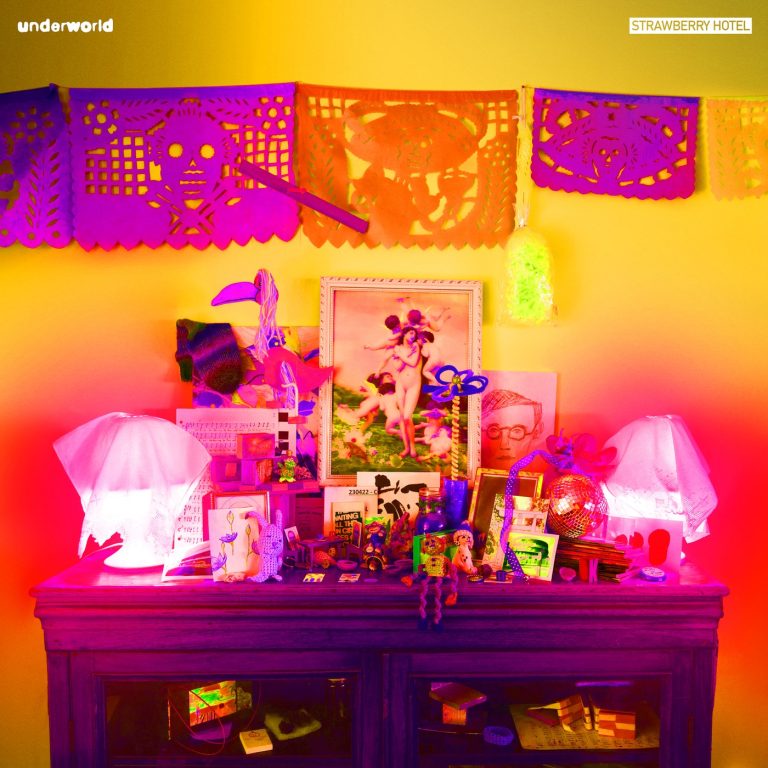There was a weird moment in the middle of the 2000s when, all of a sudden, a lot of young people started abandoning popular music in favour of techno. There was a pseudo-intellectual posture to the entire movement, as if electronic music was automatically more mature just because it concentrated on construction and composition more than rock or pop. Fair, maybe it was the drugs and sleazy air of avant-garde that suggested some sort of immediate depth. But the main aspect that was lost on that generation was the inherently absurdist nature the previous generation of musicians in the genre introduced – especially in Britain, which had become the central hub of true revolutionaries, part jesters and part occultists. The KLF used ambient collages for acidic parody, while Aphex Twin combined chaos magic and body horror to craft impressionistic satire and Boards of Canada crafted sinister sample-sigils that were dotted with hidden messaged.
Underworld were the most mature of the bunch: a flailing romantic wave artefact of the late 80s, the group evolved into a psychedelic house project, whose dense atmospheres and absurdist lyrics reflect the fragmented state of 90s Britain. The trance-like nature of their beats, covered in rich synthesiser landscapes, were framed by the stuttering admissions of Karl Hyde, who would dive into alcoholism, sex and race politics.
After a string of three records as a trio, Darren Emerson’s departure would mark a decisive cut for Underworld’s reputation. The excellent 2002 album A Hundred Days Off was considered a testament to the 90s, while the succeeding records garnered less and less attention. Ironically, their work still kept the same animalistic glow, indecisive on whether it belonged in dark alleys filled with summer rain or on afternoon radio stations. Lyrically, Hyde’s writing had lost nothing of its forceful, poetic tone, chronicling distance and delirium, both tender and brutal in its imagery.
Strawberry Hotel thus arrives with little fanfare – maybe the ravers of today have become desensitised and Gen Xers are now jaded. While not as conceptually cohesive as their last album, 2016’s Barbara Barbara, We Face a Shining Future, the album uses Underworld’s familiar tapestry for an almost spiritual re-examination of their interests in electronica.
Divided into two halves, the record first explores constant movement through a number of rich house and techno tracks. There’s the brutalist “denver luna”, whose muffled beats and sharp climaxes portray club culture vividly. “Techno Shinkansen” plays with late 90s ambient house and the dub standout “Lewis in Pomona” dives into sinister Cyberpunk atmospheres.
There are also some interesting detours into progressive territories, such as the Depeche Mode adjacent “Burst of Laughter” and the robotic “and the colour red”. The offbeat “Burst of Laughter” wouldn’t feel all too alien on a Thom Yorke project, lyrically playing with the struggles of self-hatred and generating a sense of imbalance with its echoing synth line.
With “King of Haarlem”, the project splinters into its second half. Still interested in electronic beats, the tracks become more introspective and flowery. “King of Haarlem” indulges in the spiralling portrait of summery urban spheres, with Hyde using stream of consciousness glossolalia to capture brief impressions of emotional wonder. The spoken word piece “Ottavia” features recitations from opera singer Esme Bronwen-Smith, here taking the role of Nero’s wife from the opera L’Incoronazione di Poppea. Both songs use mania to express chaos and madness within empires – one Rome, the other New York.
Besides two reworkings of prior tracks – the acapella version of “denver luna” and the “King of Haarlem” remix “Oh Thorn!” – this second half of Strawberry Hotel seems more interested in establishing an ambience that borders on storytelling. “Gene Pool” resembles the cosmic sprawl of Kraftwerk’s “Europa Endlos”, while “Iron Bones” invites Nina Nastasia onto an almost Sigur Rós-like backdrop of quiet beats and modulated voices.
While not sinister per se, Strawberry Hotel has odd moments of childlike wonder that turn into ominous psychedelia throughout its runtime. The bookends “Black Poppies” and “Stick Man Test” are almost cousins to the writing of Syd Barrett, naive melodies that feel as if there is something lurking outside of the periphery. The distorted voice in “Sweet Lands Experience” that threatens “I was more special than you were!” Nero’s mad wife. There is no daytime here, just shades of night, movement through rooms that progress in their emotional density and stack one shadow on top of another.
As always with Underworld, time becomes a stream that whirls the present into the past. It’s not as precise as Beaucoup Fish and often feels like a kaleidoscope more than a cohesive statement. The two divergent halves of the album never intermingle and propose two very opposite visions for what Underworld aim to achieve, yet there’s not really a single bad track here. Still, the tension remains, and can never quite dissolve. Maybe it’s the ghost of two years in lockdown, of years under regressive conservative leadership, of the 20 years of electronic music that fill the spaces in-between. Or maybe it’s just that techno has become, finally, adult.

